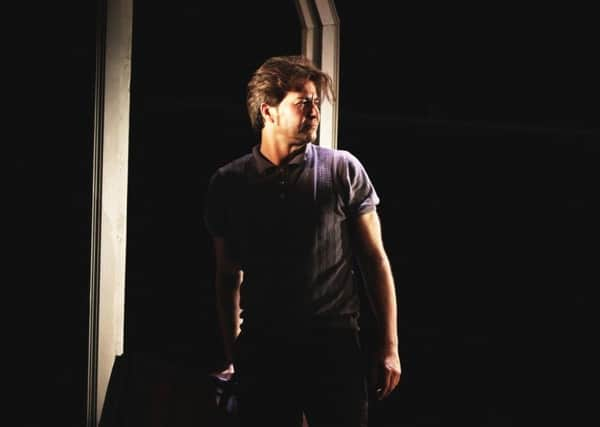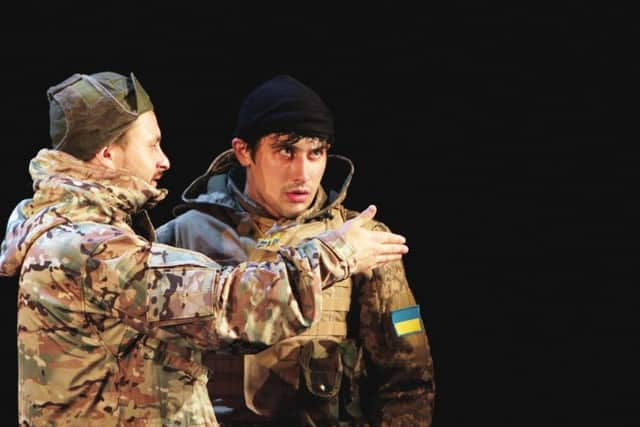Joyce McMillan: How the Traverse reached out to Ukraine


I t happens at the Traverse every January, when around 50 young writers from secondary schools across Edinburgh come together to create a series of 15 or 20 ten-minute plays, usually performed over two evenings. The idea – conceived by Traverse education officer Jane Ellis, back in 1990 – is for young aspiring writers to have the experience of working with professional actors and directors, and, crucially, of being treated with as much respect and attention, during the rehearsal process, as any professional artist; and the results are often impressive in themselves, and transformative for the young people involved.
When Class Act began, though, I doubt whether anyone would ever have imagined the scenes that took place last week in the Ukrainian capital, Kiev, as Class Act’s latest international project took to the stage. Class Act first developed an international dimension in 2004, when playwrights Nicola McCartney and Douglas Maxwell went to the Russian city of Tolyatti to work with young people who had been in the care system there. And last month – with the blessing of the Traverse, and financial support from Edinburgh University, where she teaches – McCartney set off for Kiev, to lead the first intensive ten-day Class Act session in Ukraine. The initiative came from a group of Ukrainian playwrights led by Natalia Vorozhbyt, whose play Take The Rubbish Out, Sasha formed part of the Play, Pie and Pint Ukrainian-Russian season in 2015; and the idea – following the pro-EU Maidan revolution in Kiev in 2013-14, and the subsequent outbreak of war in the Russian-influenced East Ukrainian region – was to bring together young people aged between 12 and 18, from the West Ukrainian city of Novovalynsk and the East Ukrainian city of Popasna, and to invite them to work together.
Advertisement
Hide Ad“At first, our main concerns were about persuading some of the young people to work together,” says McCartney, “and to be open with one another. The levels of mistrust between the two parts of Ukraine are very high now; people in the west often think those from the east are just pro-Russian traitors, and people in the east tend to think Kiev has been taken over by right-wing fascist nationalists who want to sell out the country to the west.


“There were two boys in particular who we paired together because they both wanted to write directly about the war; the East Ukrainian boy was so angry over the death of his father – a taxi-driver who was imprisoned and brutalised for months by the Ukrainian army – that he said he couldn’t possibly work with a West Ukrainian who only knew about war as some heroic fantasy.
“Yet in the end, they worked together, and wrote a great piece called Checkpoint. And not all the kids wanted to write about war, of course. There was one lovely girl from Popasna who began by saying she had no stories to tell – although she had been through some pretty traumatic experiences during the shelling of the city – but ended up working with a boy from Novovalynsk on this lovely piece about a boy who gets sucked into the world of Narnia, and can’t escape.”
As the public performance of the plays approached, though – it was on 27 June, at the National Academic Children’s Theatre in Kiev – the project began to attract public notice and controversy, with comments posted on social media saying that it shouldn’t be happening. People began to take sides, and prominent among the project’s supporters was Ukraine’s culture minister Yevhen Nyshchuk, an actor and singer himself, and one of the heroes of Ukraine’s Orange Revolution of 2004-05, and of the recent Maidan uprising.
“Some of the actors involved were very famous in Ukraine, which added to the media interest,” says McCartney, “and then the culture minister himself asked if he could get involved. He appeared in a play about a lad from a small Ukrainian village who wants to be an avant-garde artist, and whose father thinks this is a ridiculous idea. He played the father – and of course the audience loved this. And the atmosphere was even more intense because of the UK’s EU referendum result. I found myself being interviewed about how British voters could possibly do such a thing. People in Kiev were both incredulous and very, very anxious about this possible threat to the future of the EU, which they tend to see as a beacon of stability and democracy for their future.”


After the success of the Kiev project, McCartney’s group of Ukrainian playwrights are eager to repeat the project next year in Donetsk, the capital of troubled East Ukraine; and even in her 20th year of involvement with Class Act, McCartney still finds herself moved by the sheer power of the project to encourage young people to imagine their way into other people’s worlds.”
Advertisement
Hide Ad“With this project, it’s not only about what the young people can gain from taking part,” says McCartney. “It’s also about what we can learn from them. For example, this ethos of treating everyone equally as an artist can be a transforming experience for actors who come from a very hierarchical theatre culture. And for me as a playwright, I just find it incredibly inspiring and enriching. It reminds you of that raw power of theatre, to enable people to see things from a different point of view. There were another two boys from East and West Ukraine that we paired together, and I asked them at the end whether they had found it hard working together. “Oh, for about ten minutes,” they said. “Then it was fine.” That’s what the world needs now, in all sorts of situations. And that’s what the arts can do, no matter what.”
• The next two Class Act projects will take place in Krasnoyarsk, Siberia this autumn, and at the Traverse Theatre in January 2017.